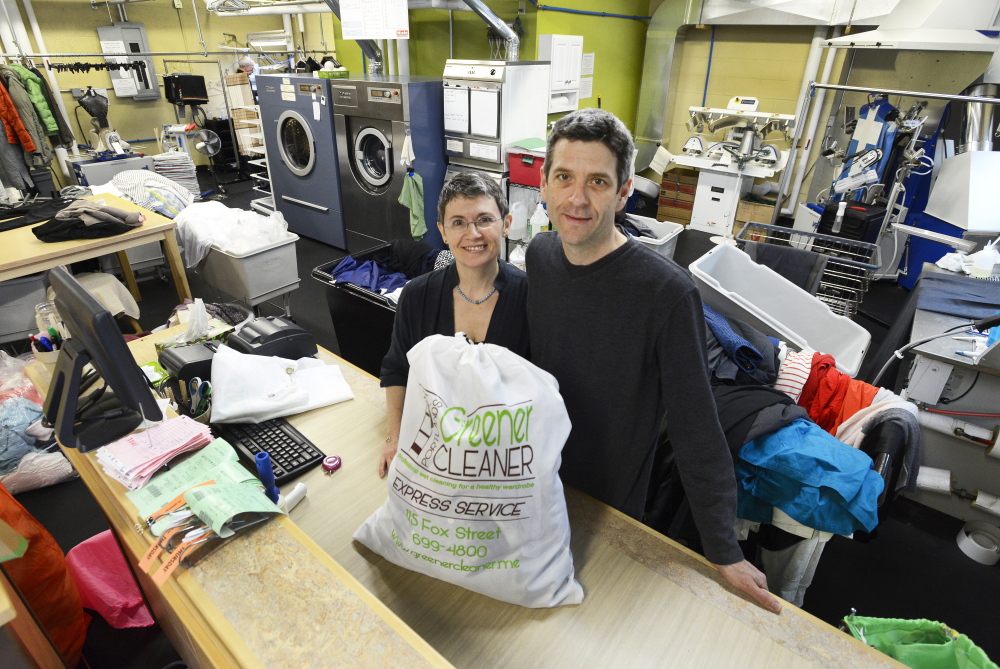Jason Wentworth runs Portland’s Greener Cleaner and Washboard Eco-Laundry with his wife, Sandrine Chabert. We called to talk about the Greener Cleaner, which offers “wet” cleaning, an environmentally friendly alternative to dry cleaning. In the course of the conversation, we learned about the hidden costs of being fashionable in the 21st century, how the Canadians made a hard thing look easy and the truth about getting a wool suit wet.
DEEP BACKGROUND: Wentworth, an Arundel native, graduated from the University of Southern Maine and then served in the Maine Legislature from 1990 to 1994. One of his jobs after that was with an alternative energy company “doing solar electric and hot water systems before it was becoming really popular,” he said. He was the guy who looked for businesses to sell the technology to. “Laundromats came up as one business that was really ripe for efficiency.” So he paid some sales calls. “I couldn’t get anybody interested,” he said. “They were competing on location and cleanliness. They weren’t trying to control their energy costs.” When he left that job in 2001, he thought maybe someday he’d bring a different mindset to the laundry business.
NO PERCS: While he was working at Bates part time as an environmental coordinator, Wentworth kept an eye on the classifieds. When the Washboard in Portland came up for sale, he jumped at the idea of its West End location (it’s at 207 Danforth St.). At that point, he already knew that dry cleaning involved serious environmental hazards. (Dry cleaning typically uses a petroleum-based solvent called perchloroethylene, aka perc, which the Environmental Protection Agency classifies as a “possible to probable human carcinogen.”) And he’d read about wet cleaning, which uses no perc and less energy. After some effort, Wentworth and Chabert were able to find a cleaner where they could outsource their customers’ cleaning: Accent Cleaners in Portland; the couple that ran Accent was eager to move away from dry cleaning. “Particularly the husband,” Wentworth said, “because he had to actually clean the dry-cleaning machine and put his head in there.”
A PLANT OF THEIR OWN: When that couple retired, Wentworth and Chabert built their own wet-cleaning plant at 115 Fox St. For research, they’d toured well-established plants in Toronto that made it all look easy. When they opened in July 2012, that wasn’t their reality. “When you go into a plant that is running really smoothly, it is easy to miss the details that are making that plant run really smoothly,” Wentworth said ruefully. “We went from having a fairly sane lifestyle to being just completely submerged by the challenges.” Today, they have worked out the kinks and have six employees. “On the financial side, it is yet to be seen if we are wildly successful,” he said. “But that is not what we are only about.”
DISPELLING MYTHS: Wentworth considers it his mission to educate customers. At a dry cleaner, the clothes go into a machine where they are soaked in the liquid solvent, usually perc – yes, wet – then the machine uses heat to evaporate the liquid. The use of the word dry “led people to think there was something magical about this process. … Generations grew up not knowing that dry cleaning meant your clothes were soaked in chemicals,” Wentworth said. A common perception is that water leads to ruin: “In many people’s minds, you can’t possibly soak a wool suit in water and not have it shrink,” he said. But before World War II, people always washed their woolens, soaking and blotting and pressing the garments themselves. That’s essentially what they do at Portland’s Greener Cleaners, but with machinery.
PRICING: Does it cost more to go green and clean? “Our prices are pretty competitive,” Wentworth said. “Some of them are a little lower.” And some higher, like the sweaters, which are hand pressed, depilled and never heated.
WET BLANKET: Sometimes, the way a garment is constructed – with cheap glues or over-saturated dyes – means it won’t handle the wet cleaning process well, and Wentworth has to turn a customer away. Modern retail clothing is often of very poor quality, he said, even the expensive stuff. “The consumer is bombarded with all this branding that convinces them that by going to Banana Republic or J. Crew that they are getting a really good deal,” he said. “Often, they are getting the latest styles but not something that is going to hold up over time.”
WHAT NOT TO WEAR: What brands can we trust, then? “I am the last person to consult for fashion,” Wentworth said. “I would just wear a pair of jeans and a T-shirt every day if I could. My wife kind of regrets that because I am kind of a slob.” His jeans? L.L. Bean.
PARTNERS: When we called, Chabert quickly steered us toward Wentworth to answer all questions, claiming he’s the better talker in the family. (She is French, and English is her second language.) But he wanted to stress how vital she is to the business. “I couldn’t have done this business without her, and I wouldn’t have.” The couple met when he was living in France. “She was my professor,” he said. “I went to France, not to find a wife, but I got that awesome benefit of going there.”
Send questions/comments to the editors.




Success. Please wait for the page to reload. If the page does not reload within 5 seconds, please refresh the page.
Enter your email and password to access comments.
Hi, to comment on stories you must . This profile is in addition to your subscription and website login.
Already have a commenting profile? .
Invalid username/password.
Please check your email to confirm and complete your registration.
Only subscribers are eligible to post comments. Please subscribe or login first for digital access. Here’s why.
Use the form below to reset your password. When you've submitted your account email, we will send an email with a reset code.